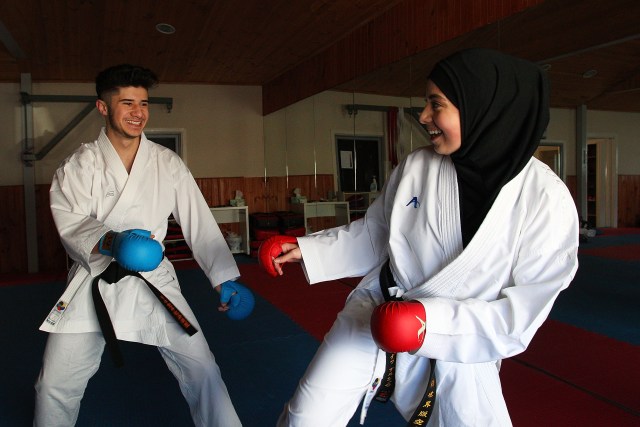Zeynab Alshelh has practiced karate since she was a young child growing up in Australia. For much of the time she has been involved with the sport, she has focused her efforts on the discipline known as shadow fighting, or Kata. Kata comprises a pre-arranged pattern of movements—kicks and punches, sweeps and strikes—that must be carried out with strength and precision, both in the movements themselves and in the transitions between them. Maintaining perfect form is everything. Alshelh says she approaches her Kata practice as if she were creating a work of art—say, writing calligraphy or painting a painting—“that is, as if the smallest movements may have the biggest impact.”
Small, bold moves with significant impact is a recurring theme in her life, both in her work and in her karate practice. Her work recently brought her to Boston, where she is a postdoctoral researcher in the Neuroinflammation and Pain Imaging Laboratory at the MGH Martinos Center for Biomedical Imaging. Her practice has won her widespread acclaim and no small number of honors and awards, and over the years has also evolved into a form of advocacy against racism and against negative ideologies about women in Islam. A Muslim woman herself, she has encountered a number of these obstacles and responded quietly but decisively: not least, by standing firm in her right to compete in her headscarf. In her insistence on maintaining her Muslim identity while forging a career in the world of karate, she has provided a strong role model for other young women in the sport and helped to dismantle pernicious stereotypes about Islam.
Alshelh began her shadow fighting practice some 15 years ago when her father enrolled her and her brothers in a karate class. She didn’t much care for it at first, she says, but she nonetheless wanted to excel at it. Even as a young girl, it seems, commitment and resolve were woven into the fabric of her character. Over the years, especially as she improved, she found she enjoyed karate more and more—to the point where her practice has now become an integral part of her identity.
Competitive sparring, or freestyle fighting, is a relatively recent development for her; she has regularly participated—and placed—in Kata competitions since she was very young. In 2013, she entered the Australian National Championships largely on a whim, trained for a couple of weeks beforehand and, much to her surprise, she says, came in second. “Clearly my years of Kata practice positively influenced my ability to spar,” she says. “This is what is so fantastic about karate: while there are many aspects to it, training in each one assists the other.” She went on to place in every state competition she entered and to collect armfuls of additional trophies, a winning streak that culminated with the first-place prize in the 2017 Australian National Championships.

As she climbed in ranking, though, she began to encounter resistance from the World Karate Federation. In 2014, she was selected to represent Australia in the US Open championship tournament. She was thrilled by the opportunity, but her elation quickly turned to disappointment when the federation told her she could not compete with her headscarf, as she always had in Australia. “This began a domino effect and suddenly I found myself denied from other tournaments and getting kicked off the Australian and state team,” she says. “I took myself out of the limelight as it became too overwhelming and I trained without competing for a couple of months.”
And even as she was reeling from the fallout of the federation’s decision, her home karate club in Australia, the one that had welcomed her and nurtured her since she was a child, started to fall apart. Disillusioned and worried about the impact of all of these changes on her emotional well-being, she packed her bags and traveled to Japan—with the hope of regaining confidence both in herself and in the sport.
She couldn’t have made a better decision. While abroad, she trained with the Japanese masters and, through them, met leaders of the Japanese Karate Federation. After getting to know her and assessing her skill, the leaders decided she was fit to run her own club, which would be affiliated with the Japanese Karate Federation. She continues: “So, I went back to Australia with newfound confidence and a new project at hand: to take over the club which was falling apart, make it a non-profit organization, and make it mine.” The club grew quickly and now has close to 40 students and three support trainers.
From the turmoil of those several years, Alshelh has emerged as an important voice challenging deeply entrenched misconceptions of the Muslim community. By showing that Muslim women can be successful in their sporting and their academic careers, she is providing a strong role model for other young Muslim women, who otherwise see few positive representations of themselves in the media. By asserting her right to compete with her headscarf, she is showing others that Muslim women have the same passions and pursuits as anyone else. And by speaking out publicly—as she has on several occasions—she is helping to steer the conversation about Muslim women in society.
She is hopeful that her efforts, and those of others like her, are making a difference. “Despite what we see in politics, I think we are witnessing a change in Australia and the U.S.,” she says. “I believe people are becoming more accepting of the headscarf on Muslim women. Even if people don’t want to accept it, they eventually will because the reality is, we’re not going anywhere. We’re here to follow our dreams just like everyone else is.”